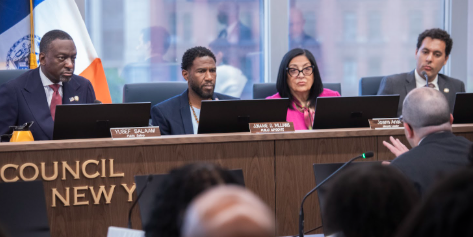
BY JAIDA DENT
The new New York Police Department (NYPD) motto is “Fighting Crime, Protecting the Public.” But what happens when the police are out of line, especially in black and brown neighborhoods? At a Sept. 22 City Council oversight hearing, members of the Committee on Public Safety questioned NYPD representatives on their disciplinary system, and the roles of NYPD Commissioner Jessica Tisch and the Civilian Complaint Review Board (CCRB) in determining punishments for police misconduct. In particular, council members questioned the commissioner’s ability to override CCRB decisions.
Committee chair Yusef Salaam of District 9, which covers Harlem, told the hearing that “New Yorkers deserve an NYPD that is accountable, transparent, and trusted to enforce the law fairly and safely.” Salaam was a wrongfully connected member of the “Central Park Five.”
The CCRB is an independent agency that handles complaints against NYPD officers, “alleging the use of excessive or unnecessary force, abuse of authority, discourtesy, or the use of offensive language.”
The hearing was grounded in Commissioner Tisch’s decision in the fatal 2019 shooting of Allan Feliz by NYPD Lieutenant Jonathan Rivera, who at the time of the incident was a sergeant. On Oct. 17, 2019, Feliz was stopped by Rivera and officers Edward Barrett and Michelle Almanzar in the Bronx for not wearing a seatbelt. While summaries show Feliz was on federal parole for “sale of a controlled substance,” Feliz was also unarmed at the time of the stop.
A struggle took place with Rivera entering the front passenger side of the vehicle, where he tased and threatened to shoot Feliz. During the struggle, the car jerked backward, and Barrett, who was outside the car, had moved away from the vehicle. Since he was not visible from the car, Rivera claimed that he was worried that “Barrett might be under the vehicle, and that any further movement of the car could injure or kill him.” This served as his justification for shooting Feliz.
During the trial, Deputy Trial Commissioner Rosemarie Maldonado had ruled that police misconduct did occur and that “he [Rivera] was not justified in shooting Allan Feliz point-blank in the chest, out of his stated fear for the safety of a fellow officer.” Maldonado did not find the shooting justified because “critical portions of [Rivera’s] account were self-serving [statements] fabricated to minimize his culpability.”
Maldonado recommended that Rivera face termination. However, Commissioner Tisch wrote a final decision that contradicted Maldonado’s, ruling that Rivera was justified in the shooting and would not receive any punishment.
Representing the NYPD were Michael Gerber, NYPD Deputy Commissioner for Legal Matters, and Tarek Rahman, the NYPD Department Advocate. In their opening statement, Gerber stated that the NYPD’s “disciplinary system must be fair and effective” and that the process “must move faster”. He also explained what the CCRB’s role is when confronting cases of police misconduct.
The CCRB gets evidence from the NYPD and conducts its own investigation of the allegations presented. The Board will then come to its own findings and give its recommendations for the next course of action to the NYPD. However, in a severe misconduct case, it has the potential to go to trial, and “a department judge will hear testimony and receive evidence before making a recommendation to the police commissioner,” said Gerber. The trial that occurs is not a criminal trial, but rather an administrative trial conducted within the NYPD system. After the CCRB shares its findings, the police commissioner has the final decision on what happens to the officers in each case.
District 22 Councilmember Tiffany Cabán began her line of questioning by redetailing the Feliz case for the courtroom. She asked Gerber, “Why should the police commissioner’s judgment be substituted for the deputy commissioner of trials, who is the factfinder in an NYPD trial room?” Gerber asserted that Tisch made the “decision that she thought was correct based on the facts and the law.”
Councilmember Carmen De La Rosa, who represents District 10 in Washington Heights, was especially passionate about the death of Feliz, “a constituent,” and the subsequent decision by the commissioner. She asked, “What is the message that we are sending to New Yorkers at this time?”
In response, Gerber answered, “The message, I think, from Commissioner Tisch is, she is committed to doing this to the best of her ability […] to have a fair and thorough process. We do believe in that. That is what we are trying to do.”
Council members were not convinced. Councilmember Althea Stevens of District 16 in the South Bronx spoke about the lack of trust between the NYPD and the public. “The message is that the NYPD is above the law […] Because when we are shot dead like dogs in the street, you say, ‘We took everything into consideration.’”
NYC Public Advocate Jumaane Williams questioned how one person, the NYPD commissioner, has the final decision when the CCRB does an equal share of work in investigating these cases.
“The main problem is that one person can override all of it. So it’s almost as if we don’t even need a deputy commissioner as a judge. We don’t need CCRB. We don’t need anybody; all we need is a commissioner,” said NYC Public Advocate Jumaane Williams.
